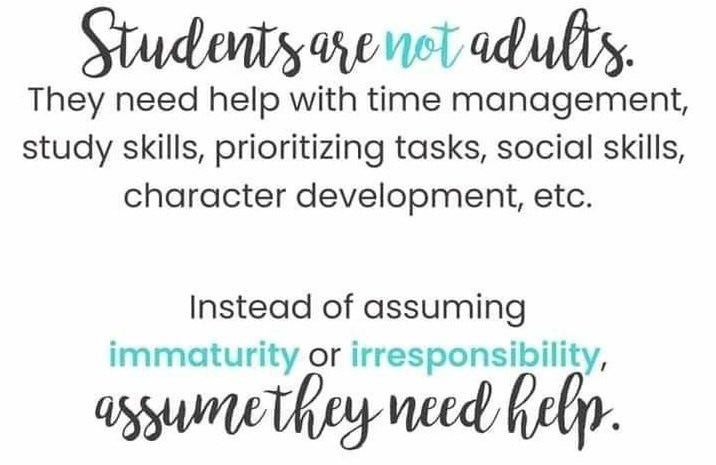The Complexity of Learning Loss

Insights from Educate, 4th Edition.
Welcome to the 4th edition of Insights from Educate. Keep reading for a recap of the recent articles published on Educate., a glimpse into the latest news in education, and a roundup of professional learning ideas to keep you inspired and motivated.
I have been thinking more about the “learning loss” phrase being bandied about in education circles. There is no question that students around the world have missed a significant amount of school this year.
The pandemic has disrupted the lives of families and forced parents to be work-at-home parents, teachers, and employees. Students have been relegated to endless Zoom meetings and endured more screen time than is recommended.
However, if there is one thing I know about students it is this — they are incredibly resilient. Yes, students are mostly behind in coursework, and there will be a need to play catch-up in all content areas.
Will students enter the next school year with the full breadth of knowledge that is to be expected? No, they will not. But the playing field will be as level as it can be for most students. A lucky few, mostly the privileged, will have had tutors and co-ops to guide them through their studies, but most students will have fallen behind in the current standards.
John Ewing reflects on this supposed learning loss in “The Ridiculousness of Learning Loss”:
Learning is complicated. Plutarch famously wrote that minds are not vessels to be filled but fires to be kindled. Fires don’t leak. You don’t measure them in months. Learning loss is a calculation masquerading as a concept — a rather shallow, naïve, ridiculous concept.
Some learning loss is inevitable, but how are we measuring it? This will be a question we continue to answer through the next school year as schools re-open and students continue traditional education.
Perhaps, more importantly, we should remember this unexpected educational experiment as a time to reflect on the nature of our schools. There has been a resounding embrace of technology across the U.S., more so than I have ever seen in my career as an educator.
In the article “The Irreversible Change of Education — for Good”, the author notes:
Moreover, a lot of research has proven that learning online can even be more effective than the traditional learning. On average, students retain 25–60% more material when learning online compared to only 8–10% in a classroom. This is mostly due to students being able to learn faster online, e-learning requires 40–60% less time to learn than in a traditional classroom setting because students can learn at their own pace, going back and re-reading, skipping or accelerating through concepts as they choose.
For some students, online learning has been a success and a welcome change from the in-person learning experience. Teachers have been able to individualize lessons and meet students in small groups and/or individually, something that is harder to do in standard in-person classes.
Of course, online learning depends on equitable access, which we have already established is not a reality, especially when we had the opportunity to consider offering every student a computer early in the pandemic but did not.
Students with special needs and English Language Learners should continue to be remembered as we debate school openings. Teachers note, “when children are learning another language, she says, it’s important for them to see nuances of communication, such as facial expressions and other non-verbal signs. But those are also harder to make out on a screen.” There is no question that many students are sorely missing the support they need in their brick-and-mortar classrooms.
It all comes back to the same conclusion: we need a better way to individualize education for students. We currently teach to the middle, or the average, with standards that are designed to keep students on-track. While this creates easier classroom management and lesson planning, it does not provide an equitable education for all students.
Students come to our classroom with a range of needs, and this pandemic has shown us that there is another way to educate, infused with technology, human connection, and a recognition that each of our brains is unique.
Subscribe to Insights from Educate to receive a midweek dose of professional learning and inspiration with the latest news and research from the education industry. Delivered right to your mailbox.
The Latest on Educate.
How Pets Can Enhance STEM Teaching and Learning by Andrew B. Raupp
Whether you’re thinking about adopting a pet or are just looking for ways to enhance engagement in the classroom, connecting to animals provides a wealth of learning opportunities.
Is It Time to Boycott the SAT/ACT by Walter Bowne
While the standardized test is not, by definition, an “immoral law,” the test is an impediment for many; an obstacle for all those except the few who have the time and the money to help navigate and game the system.
The 9 Easiest Ways to Get Free Journal Research by Some Dude Says
Most of these methods will provide peer-reviewed sources, but there’s also a reason some journals don’t charge for access. You need to be cautious to weed out the trash from the treasure.
Laptops vs Notebooks in the Classroom by Wipebook
There are benefits to utilizing a pen and paper such as minimizing distractions, utilizing disfluency, and practicing selectivity of information.
The Who, What, Why, and How of Writing an Article with Value by Jennifer Osborne
Clear and concise writing reflects an understanding of the relationship between audience, purpose, and tone to create meaning and value through content.
Schools Need More Counselors, Not Less by Jennifer Osborne
After months of remote learning, consisting of new routines, expectations, and challenges, students will continue to need the support of their school counselors.
Education in the News
Miguel Cardona has officially been confirmed as the Education Secretary
A Pennsylvania school district is being sued by a cheerleader that was suspended for lambasting the school on Snapchat with a series of F-bombs. The U.S. Supreme Court has agreed to hear the case, which might provide more guidance on whether schools can discipline students for social media comments.
Voucher advocates are hopeful the pandemic will pave the way to re-ignite the school choice issue. Opponents argue vouchers siphon money away from districts and subsequently, students.
A property-design company in Boston has recently released an open-air design for classrooms to pave the way for outdoor education spaces.
The Education Department is firm that students will be required to participate in state accountability tests despite pandemic interruptions to learning. An official with the department, Ian Rosenblum, notes, “state assessment and accountability systems play an important role in advancing educational equity.” The department maintains there will be flexibility in testing.
Professional Learning and Inspiration
The Key to Better Student Engagement Is Letting Them Show You How They Learn- Ed Surge
Visible thinking and self-awareness are vital to student learning. Once students are asked to explain or “teach” information, they often demonstrate a mastery that would have gone unnoticed or unaccomplished had they simply filled in bubbles on a test.
When students have agency over the path, pace, time and place of their learning, they will invest in it. The more we all make our thinking visible to each other, the better equipped we are to build strong, equitable learning communities that can thrive in these fluid educational circumstances.
Is Hybrid Learning Killing Teaching? by Robert Pondiscio
There is a very real fear that teachers will be forced to teach both in-person and online…at the same time. Educators are already beginning to exit the profession due to the expected hardships of trying to teach remotely during a pandemic. As schools begin to open, teachers will once again need to quickly adjust to the new normal of teaching.
Not all hybrid teaching is created equal. Pershan makes the subtle but important point that “synchronous” hybrid learning, with only a few kids present in-person is really hard; when just a few kids are online it’s more manageable.
Vaccinate Against Cheating with Authentic Assessment- Inside Higher Ed
Authentic assessments should be at the forefront of instructional planning. They provide student agency and a relationship between content and life. When students are asked to show learning through real-life scenarios and solutions, they are more motivated and involved in their learning.
Well-formed assessments should be the pinnacle of the course. They are where the student tries out applying what has been learned to a sampling of important, relevant problems. These can be messy. They can require multiple tries. Many are best done in front of an audience.

Follow Educate.
Subscribe to Insights from Educate to receive a midweek dose of professional learning and inspiration with the latest news and research from the education industry. Delivered right to your mailbox.
About Educate.
Educate is a new publication on Medium focused solely on the education industry.
Educate magnifies the voices of changemakers in education. We empower educators to share their stories, ideas, insights, and inspiration. We are dedicated to the fusion of research + education policy and practice.
The mission of this publication is to inform education policy and practice through the authentic voices that are directly involved in education. We do this by using research to drive ideas and insights.
Write for Educate.
We would love to share your voice. Educate features research-driven articles focused on the education industry. Please review the submission requirements: Write for Educate
Need guidance on writing a research-driven article? Review the common attributes below: How to Write a Research-Driven Article
Send questions to educate@jenniferosbornewrites.com
About the Editor
Jennifer Osborne is an experienced educator with graduate degrees in Educational Leadership and Guidance and Counseling. She has taught in five countries across a wide variety of classrooms and schools. Jennifer is passionate about authentic education for students and personalized professional learning for teachers.
Read her Educator’s Bio at Jennifer Osborne Writes.
The Complexity of Learning Loss was originally published in Educate. on Medium, where people are continuing the conversation by highlighting and responding to this story.


